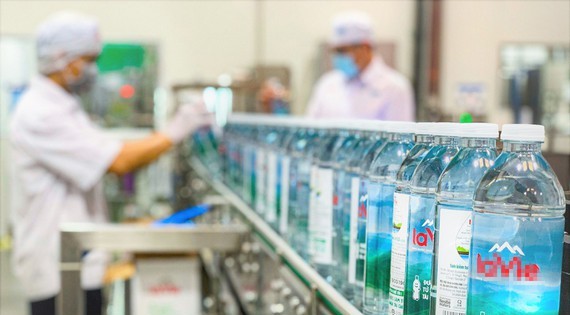The survey conducted by the VBCSD within the framework of the Vietnam Chamber of Commerce and Industry (VCCI) was conducted from May to September among 100 medium and large enterprises in the food and non-alcoholic beverage sector.
The representative of the VBCSD said that the circular economy is becoming an inevitable trend to meet the demands of sustainable development in the context of increasingly degraded and depleted resources, a polluted environment and severe climate change. The circular economy helps to minimize the risks of a crisis of overproduction and scarcity of resources, to reduce production costs and to increase the supply chain of companies.
Mr. Fausto Tazzi, Managing Director of La Vie Company, Vice President of PRO Vietnam, said La Vie Company and members of the Nestlé Group are committed to implementing plans to reduce the amount of virgin plastic in packaging, reduce plastic waste at source and contribute to initiatives to collect the same amount of packaging that the company has put on the market by 2025. This is one of the company’s efforts to target a zero waste future. Currently, most of La Vie’s products are fully recyclable. In early 2021, La Vie became the first mineral water brand in Vietnam to use recycled plastic bottles (rPET) that meet food packaging standards.
Likewise, Ms. Nguyen Thi Thu Hang, Head of Public Affairs, Communications and Sustainability for Coca-Cola Vietnam, said the company aims to collect and recycle every plastic bottle or can of soft drink sold and to use at least 50% recyclable materials. material in packaging by 2030.
Previously, as part of the “A World Without Waste†strategy, many Vietnamese companies joined together to create the Packaging Recycling Organization Vietnam (PRO Vietnam). The companies also cooperated with the Center for Supporting Green Development (GreenHub) to carry out the action network project to reduce, reuse or recycle plastic waste to improve local recycling activities, ensuring three criteria safety and practicality. This model can be replicated for household waste collection units and individuals. The project has been implemented in Ha Long City in Quang Ninh Province and most recently in Can Gio District in HCMC.
Promote the waste recycling market
Mr. Huynh Minh Nhut, director of HCMC Urban Environment Company Limited, indicated that the company and PRO Vietnam had signed a memorandum of understanding on the construction of a network for the collection and treatment of recycled waste from the waste sorting program. domestic solid waste at source. As a result, the network built by both parties will collect and process recyclable waste to create new resources from the waste, thus helping to reduce the volume of waste going to landfill, as well as reducing carbon emissions, thus improving efficiency. environmental protection. The implementation of the above project is the basis for the establishment of a market for the recovery and recycling of waste in order to use the resources obtained from waste in the service of economic development and the construction of a circular economy. More importantly, it also shows the responsibility of the business community in partnering to protect the environment with HCMC in particular and the country in general.
Currently, only 8.6 percent of production participates in the cycle. With this ratio, the demand for resource consumption in 2060 will double compared to 2015, putting pressure on environmental ecology. ‘Therefore, companies must develop a roadmap for a circular strategy from the point of view of senior management, taking steps such as improving the production process, product and business model, to bring many benefits not only in terms of saving resources and protecting the environment, but also in terms of promoting economic growth and social benefits, â€said Brendan Edgerton, Director of Circular Economy at the World Council of companies for sustainable development.
The economy will enter a closed cycle with the global and full participation of industries, professions and production areas through the sharing of information, the application of new business models and the combination of the supply chain to achieve scientifically calculated objectives with the support of the legal system and government management regulations. At this time, companies no longer have to consume a large amount of resources to achieve positive economic growth figures. At the same time, they will obtain positive environmental and social benefits to completely transform the production and consumption system in a new direction, helping to minimize climate change, degradation of natural resources and escalating inequalities.

